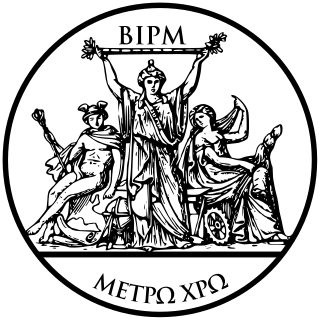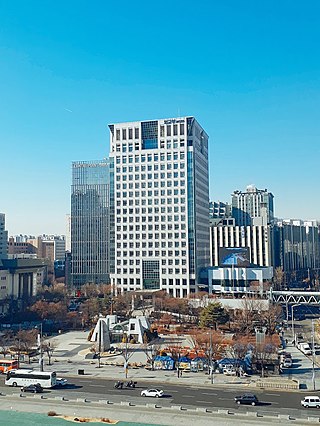
The International Bureau of Weights and Measures is an intergovernmental organisation, through which its 59 member-states act on measurement standards in four areas: chemistry, ionising radiation, physical metrology, as well as Coordinated Universal Time. It is based in Saint-Cloud, near Paris, France. The organisation has been referred to as IBWM in older literature.
The General Conference on Weights and Measures is the supreme authority of the International Bureau of Weights and Measures (BIPM), the intergovernmental organization established in 1875 under the terms of the Metre Convention through which member states act together on matters related to measurement science and measurement standards. The CGPM is made up of delegates of the governments of the member states and observers from the Associates of the CGPM. It elects the International Committee for Weights and Measures as the supervisory board of the BIPM to direct and supervise it.

Metrology is the scientific study of measurement. It establishes a common understanding of units, crucial in linking human activities. Modern metrology has its roots in the French Revolution's political motivation to standardise units in France when a length standard taken from a natural source was proposed. This led to the creation of the decimal-based metric system in 1795, establishing a set of standards for other types of measurements. Several other countries adopted the metric system between 1795 and 1875; to ensure conformity between the countries, the Bureau International des Poids et Mesures (BIPM) was established by the Metre Convention. This has evolved into the International System of Units (SI) as a result of a resolution at the 11th General Conference on Weights and Measures (CGPM) in 1960.

Daejeon is South Korea's fifth-largest metropolis, with a population of 1.5 million as of 2019. Located in the central-west region of South Korea alongside forested hills and the Geum River, the city is known both for its technology and research institutions, and for celebrating its natural environment, with most mountains, hot springs, and rivers freely open for public use. Daejeon serves as a hub of transportation for major rail and road routes, and is approximately 50 minutes from the capital, Seoul, by KTX or SRT high speed rail.

The Physikalisch-Technische Bundesanstalt (PTB) is the national metrology institute of the Federal Republic of Germany, with scientific and technical service tasks. It is a higher federal authority and a public-law institution directly under federal government control, without legal capacity, under the auspices of the Federal Ministry for Economic Affairs and Energy.
Park Kwang-su is a South Korean filmmaker. He was born in Sokcho, Gangwon Province and grew up in Busan. Park joined the Yallasung Film Group as a student of Fine Arts at Seoul National University. Upon graduation, he founded and led the Seoul Film Group which was dedicated to renewing Korean film culture and closely tied to the student protest movement. The Seoul Film Group was a significant part of the independent film movement and a strong voice speaking out against the military dictatorship. Park studied film at the ESEC film school in Paris, then returned to Korea to work as an assistant director to Lee Chang-Ho. He made his own first feature in 1988, and in 1993 became the first Korean filmmaker to found his own production company.

Kyunggi High School is the oldest modern high school in Korea, located in Gangnam District, Seoul. The school is an all-boys school, and its counterpart is Kyunggi Girls' High School, also located in Gangnam District, Seoul.

Chung Un-chan is a South Korean politician who was the Prime Minister of South Korea (2009–2010). He was a professor of Seoul National University from 1978 to 2009, serving as the president of the university from July 2002 to July 2006 until he was designated to the Prime Minister. He is the current commissioner of the Korea Baseball Organization.

South Korea's Ministry of Foreign Affairs is in charge of the country's foreign relations, as well as handling matters related to overseas Korean nationals. It was established on 17 July 1948.

The Korea University of Science and Technology (UST) is a group of public research institutions in Seoul, Suwon, Changwon, Ansan, Seongnam and Daejeon, in South Korea. UST is the leading government-funded research university dedicated to the synergistic effects of research and education in Science and Technology. The UST was established in 2003 by the Ministry of Science, ICT and Future Planning as the nation’s graduate school specializing in science and engineering education and research. The UST runs only a graduate school. Creating the new driving force for growth would play a major role in leading national growth in the new century. The South Korean government established the UST to produce professionals in the field of combined technologies, thought of as one of the most important criteria for creating the driving force for South Korea's national growth. Today, UST continues to develop itself into a major research university.
Yang Sung-chul is a South Korean political scientist, politician, and diplomat.
Science and technology in South Korea has advanced throughout the decades. The advancement of science and technology has become an integral part of economic planning in South Korea. Fast-growing industries have created a massive demand for new and more advanced technologies. Additionally, Korean scientists propose that the advancement of science and technology in partnership with North Korea could help facilitate the peaceful reunification of North Korea and South Korea.

Shin Sung-chul is a South Korean physicist and the 16th president of KAIST. Shin was the first president of DGIST since it changed its form from a research institute to a university in 2011. His main research areas as a scientist are spintronics and nanomagnetism. As of June 2014, Shin is the founding president of DGIST university, Fellow Professor of University of Ulsan, a member of Presidential Advisory Council on Science & Technology (PACST), the chair of Committee for Future Strategy, PACST, and a Fellow of the American Physical Society (APS).
The MIKTA Speakers' Consultation 2015 took place in Seoul, Republic of Korea on July 1–5 under the theme "Parliamentary Leadership for a Global Future." Initiated by Chung Ui-hwa, Speaker of the National Assembly of the Republic of Korea, the MIKTA Speakers' Consultation 2015 was the inaugural meeting of the parliamentary Speakers of MIKTA, a middle-power consultative mechanism.
Korean units of measurement, called cheokgwan-beop or cheokgeun-beop in Korean, is the traditional system of measurement used by the people of the Korean peninsula. It is largely based on the Chinese system, with influence from Japanese standards imposed following its annexation of the Korean Empire in 1910. Both North and South Korea currently employ the metric system. Since 2007, South Korea has criminalized the use of Korean units in commercial contexts, but informal use continues, especially of the pyeong as a measure of residential and commercial floorspace. North Korea continues to use the traditional units, although their standards are now derived from metric conversions.
The National Quality Management Commission, formerly the State Administration of Quality Management of the Democratic People's Republic of Korea (SAQM) is the North Korean standards organization. It oversees standards and metrology, including application of both the metric system and traditional Korean units, in accordance with the 1993 Law on Metrology. It is located at 1 Inhung-Dong in Moranbong District, Pyongyang.

Chung Eui-yong is a South Korean diplomat and a politician served as Minister of Foreign Affairs from 2021 to 2022. Chung was previously President Moon Jae-in's first Director of National Security from 2017 to 2020.
Choong Eui Song is a South Korean organic chemist.
Kwang Hwa Chung is a South Korean physicist who has served as president of the Korea Research Institute of Standards and Science and the president of the Institute for Basic Science. She has received the Moran Medal of the Order of Civil Merit, as well as other honors and awards for her scientific research and work to promote professionalism for women in STEM fields.











